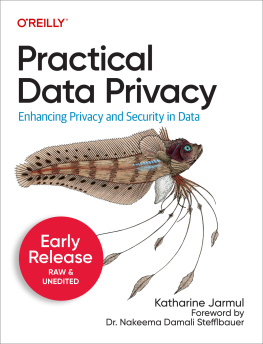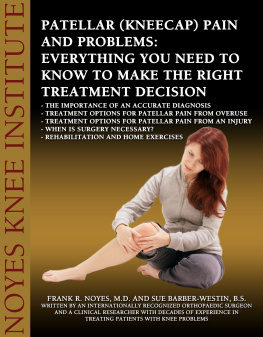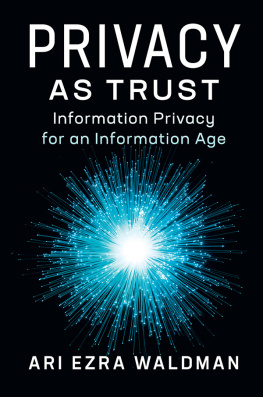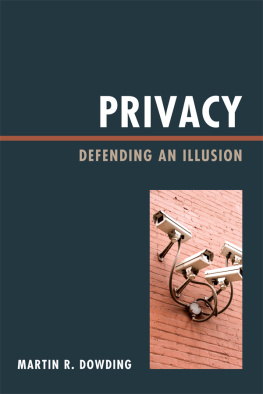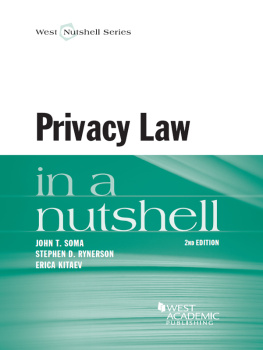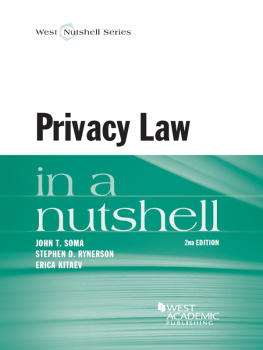Westin - Privacy and freedom
Here you can read online Westin - Privacy and freedom full text of the book (entire story) in english for free. Download pdf and epub, get meaning, cover and reviews about this ebook. City: United States., year: 2018, publisher: Ig Publishing, genre: Science. Description of the work, (preface) as well as reviews are available. Best literature library LitArk.com created for fans of good reading and offers a wide selection of genres:
Romance novel
Science fiction
Adventure
Detective
Science
History
Home and family
Prose
Art
Politics
Computer
Non-fiction
Religion
Business
Children
Humor
Choose a favorite category and find really read worthwhile books. Enjoy immersion in the world of imagination, feel the emotions of the characters or learn something new for yourself, make an fascinating discovery.

Privacy and freedom: summary, description and annotation
We offer to read an annotation, description, summary or preface (depends on what the author of the book "Privacy and freedom" wrote himself). If you haven't found the necessary information about the book — write in the comments, we will try to find it.
Privacy and freedom — read online for free the complete book (whole text) full work
Below is the text of the book, divided by pages. System saving the place of the last page read, allows you to conveniently read the book "Privacy and freedom" online for free, without having to search again every time where you left off. Put a bookmark, and you can go to the page where you finished reading at any time.
Font size:
Interval:
Bookmark:
Contents
Acknowledgments
THIS BOOK would not have been written, at least in its present scope and comprehensiveness, were it not for two organizations. First is the Special Committee on Science and Law of the Association of the Bar of the City of New York, which sponsored, guided, and reviewed the study that led to this volume. I profited greatly and often from the counsel of the Committee membersEdward J. Bloustein, John W. Brumbaugh, George H.P. Dwight, Kenneth R. Frankl, Everett L. Hollis, Daniel James, John M. Kernochan, William A. W. Krebs, Jr., Arthur W. Murphy, Bethuel Webster, and Adam Yarmolinsky. A special debt is owed to the Committees gifted chairman, Oscar M. Ruebhausen, and its energetic secretary, Bevis Longstreth. The second godfather of this volume is the Carnegie Corporation of New York, whose interest and support sustained the work. To John Gardner, James Perkins, Alan Pifer, Fritz Moser, Margaret Anderson, Margo Viscuzi, and to the Carnegie Board of Trustees goes my appreciation for acts both fiscal and intellectual.
During the research stage, the following persons served as continuing consultants or advisers to the project: Paul Bator, William M. Beaney, William O. Baker, Ralph Brown, Norman Cantor, Charles C. Hughes, Yale Kamisar, Stanley P. Lovell, Robert J. Lifton, Arnold Simmel, Paul S. Visher, and George E. Valley, Jr. Leo Beranek, Francis Weiner, and Charles Dietrich, of the firm of Bolt, Beranek, and Newman, provided reports as consultants on physical-surveillance technology, as did Nathan Kline, Eliot Chappie, Herbert Spiegel, and Peter Wotton, on psychological-surveillance issues.
I was fortunate in having a talented group of research assistants throughout the life of the project. Gordon M. Stevenson and Heather Feldman worked on the whole study and contributed to it continuously. On its legal side, I drew on the efforts of Edward R. Bendet, Michael Curzan, Robert Z. Dobrish, Robert E. Easton, William D. Friedman, Stephen Gardner, Harvey J. Goldschmid, Richard Goldsmith, Charles L. Grimes, Lawrence D. Horowitz, Mary V. Magilligan, Perry W. Morton, Stephen M. Nassau, John D. Niles, Michael R. Pames, Jonathan E. Perlow, Arthur Schatten, Richard F. Scott, Martin Self, and Shoshana Tancer. In studying the functions of privacy, I was aided by Elinor Berlin, Barbette Blackington, Virginia R. Boehm, Caren Goretsky, Thomas Gregor, George Latimer, Patricia A. Lee, Jane Shapiro, and William J. Sittig. Work on aspects of privacy in Western history was aided by Taylor Albert, J. Paul Blum, Stephen Cole, David Flaherty, Marvin E. Gettleman, Louis Menashe, Ronald Moe, and Alan Posner. A small but important grant from the Columbia University Council for Research in the Social Sciences aided in several of the research activities in which the above-named assistants were engaged.
Into a group whose members offered intellectual encouragement and helpful suggestions to the project I would put David F. Cavers, Lee J. Cronbach, Samuel Dash, Charles R. DiCarlo, G. Everett De More, Louis L. Jaffe, Harry Kalven, Jr., Franklin A. Lindsay, Francis J. McCarthy, J. Robert Oppenheimer, Dwight C. Smith, Jr., Robert C. Sprague, Herbert Wechsler, John W. Wade, and Carroll L. Wilson. Colleagues within the Association of the Bar were continually helpful, notably Harry H. Almond, Jr., Granville M. Brumbaugh, Herbert Brownell, Dudley Bonsai, Mark N. Donohue, Paul B. De Witt, Orison S. Marden, Russell D. Niles, Samuel I. Rosenman, and John S. Walker.
While data were being gathered, I either saw or had aid through correspondence from a considerable number of government officials, organizational leaders and staffs, and specialists in particular fields. Because I think some of those I interviewed would prefer not to be mentioned, I have omitted a few names, but the following were most helpful: Sam Archibald, David C. Acheson, Ben H. Bagdikian, Bernard S. Benson, Frank Bartimo, Howard F. Cerny, Norman B. Cornish, Edward E. David, Julius C. C. Edelstein, Bernard Fensterwald, Jr., Robert R. J. Gallati, Frank Hogan, Najeeb E. Halaby, Evin Jenkins, Benny L. Kass, Nicholas DeB. Katzenbach, Spurgeon Keeney, George W. Lindberg, Eliot A. Lumbard, Horace P. Moulton, John McNaughton, Alice Miller, John Pierce, Emanuel R. Piore, John Quisenberry, Philip J. Ruffo, Richard M. Scammon, M. R. Schroeder, Alfred J. Scotti, Walter T. Skallerup, Jr., Arnold Sagalyn, Paul Schrade, Theodore J. St. Antoine, Glenn E. Watts, Eric Witt, David Worgan, and Kenneth Young.
In two areas, I asked specialists to read my first drafts and criticize the discussion developed there; though I profited from these reactions, the following have no responsibility for the shortcomings that may still remain in these sections. In the area of personality testing, I am grateful to Gordon W. Allport, Richard S. Barrett, George K. Bennett, Charles P. Bowen, Jr., Isidore Chein, Walter V. Clarke, John D. Dole, Edwin W. Davis, Robert L. French, Leo Goldman, Stephen Habbe, Raymond A. Katzell, Harry Levinson, Robert N. McMurry, Perry L. Rohrer, Floyd L. Ruch, Charles K. Rudman, Harold Seashore, Ross Stagner, King Whitney, Jr., Allen V. Williams, and Arthur A. Witkin. In the field of data collection and computers, I was aided by Franz L. Alt, Paul Baran, Edmund C. Berkeley, Orville Brim, Jr., S. D. Conte, Robert B. Forest, Roy N. Freed, Bernard A. Galler, Robert M. Gordon, R. W. Hamming, A. R. Hibbs, A. R. Householder, George Kennard, Robert Patrick, R. E. Pickett, Jr., L. T. Rader, Gordon D. Sikes, Norman Statland, Louis Sutro, John Todd, H. W. Trimble, Jr., C. H. Wacker, Arnold K. Weber, Stanton Wheeler, and Burton R. Wolin.
The section on the functions of privacy was aided by the thoughtful readings contributed by Conrad Arensberg, Charles C. Hughes, Robert J. Lifton, Robert K. Merton, Robert F. Murphy, and Kurt H. Wolff.
After the manuscript was completed, it was read by Alice Kwartler and Mary OMelveny, both of whom helped to clarify thought and improve language. My wife, Bea, and my sister-in-law, Elinor Miller, were subjected to the readings-aloud and what-do-you-think-of-this-approach? which authors inflict on those too near and dear to turn them away. They always gave me the lift I needed and let me drop when the performance did.
During the writing of this book, I was able to try out the ideas being developed at a number of conferences and before various professional groups. The most important of these, sponsored by the Special Committee on Science and Law, was a conference on The Impact of Technological Progress on Privacy, held at Onchiota Conference Center, Tuxedo, New York, on May 2426, 1964. Those attending this stimulating and fruitful meeting were W. O. Baker, Alan Barth, William M. Beaney, Simon Michael Bessie, Edward J. Bloustein, Eliot Chappie, E. E. David, George H. P. Dwight, Kenneth R. Frankl, Stanley H. Fuld, Stuart Hampshire, Frank S. Hogan, Everett L. Hollis, Daniel James, John M. Kernochan, Nathan Kline, William A. W. Krebs, Harold D. Lasswell, Lee Loevinger, Bevis Longstreth, Robert S. Morison, Arthur W. Murphy, John dej. Pemberton, Jr., Alan Pifer, Rt. Rev. James A. Pike, Samuel Rosenman, Oscar M. Ruebhausen, Stephen I. Schlossberg, Edward A. Shils, Herbert Spiegel, Harris B. Steinberg, George E. Valley, Jr., Ralph V. Ward, George T. Washington, Bethuel Webster, William Webster, Joseph Wershba, and Adam Yarmolinsky.
Other groups before whom I appeared and tested some of the ideas in this book included the Center for the Study of Democratic Institutions, Santa Barbara, California; the Anglo-American Legal Conference, Ditchley House, Enstone, Oxfordshire, England; the Biennial Conference of the American Civil Liberties Union; the Brookings Institution Conference for Federal Investigative Officials; and the Harvard University Program on Technology and Society. I also ran the gauntlet of professional groups in almost all the fields that I had the temerity to advise about invasions of privacy. These included the American Psychological Association, American Personnel and Guidance Counselors Association, American Orthopsychiatric Association, American Political Science Association, and American Federation of Information Processing Societies.
Next pageFont size:
Interval:
Bookmark:
Similar books «Privacy and freedom»
Look at similar books to Privacy and freedom. We have selected literature similar in name and meaning in the hope of providing readers with more options to find new, interesting, not yet read works.
Discussion, reviews of the book Privacy and freedom and just readers' own opinions. Leave your comments, write what you think about the work, its meaning or the main characters. Specify what exactly you liked and what you didn't like, and why you think so.

